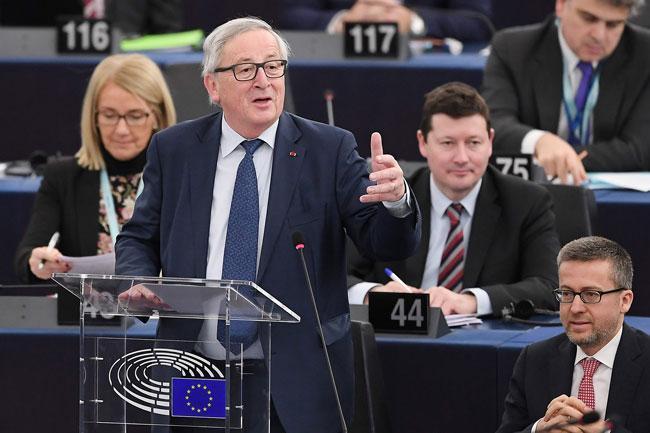EU urges Putin to ‘re-establish’ security cooperation
BRUSSELS

EU Commission chief Jean-Claude Juncker urged Vladimir Putin on March 20 to help “re-establish” continental security cooperation following his re-election, amid mounting concern over the poisoning of an ex-spy in Britain.
“I have always argued that positive relations between the European Union and Russian Federation are crucial to security of our continent,” Juncker said in a congratulatory letter to the Russian president.
“Our common objective should be to re-establish a cooperative pan-European security order,” said the letter released by Juncker’s spokesman.
Juncker added: “I hope that you will use your fourth term in office to pursue this goal. I will always be a partner in this endeavor.”
His congratulatory missive came a day after EU foreign ministers offered Britain “unqualified solidarity” in a dispute with Russia.
British Prime Minister Theresa May said her government believes that Russia was behind the March 4 poisoning of former double agent Sergei Skripal in the English city of Salisbury.
“The European Union takes extremely seriously the U.K. government’s assessment that it is highly likely that the Russian Federation is responsible,” the EU foreign ministers’ statement said.
The Kremlin has denied the charge, demanding London either come up with proof of Russia’s involvement or apologize.
EU sources say some states, including Greece, have been reluctant to put pressure on Moscow over the incident.
The nerve agent attack is expected to be discussed at an EU summit in Brussels starting on March 22.
The 28 leaders will wait to see what answers Moscow provides on the nerve agent attack issue.European Council President Donald Tusk said last week after speaking to British Prime Minister Theresa May that he was putting the attack on the agenda of the first day of the summit.
May will not be at the second day of the summit when leaders will discuss Brexit negotiations.
The EU leaders also call for the bloc to “strengthen its resilience to chemical biological radiological and nuclear related risks” and ask European diplomatic chief Federica Mogherini to report back to them in June.
The leaders will decide whether or not to sign off on the statement at the summit.
The EU has been increasingly concerned with a more assertive Russia in the past few years, especially after Moscow annexed Ukraine in 2014, triggering the first in a series of European sanctions.
Chemist says he worked on nerve agent
A Russian scientist told state media on March 20 he worked on an official program to produce the nerve agent Britain says was used against ex-spy Sergei Skripal, contradicting Moscow’s claims it never developed Novichok.
Leonid Rink, who told RIA Novosti he worked on a state-backed program up to the early 1990s, added that the former double agent and his daughter would be dead had Moscow been involved in his poisoning.
“They are still alive. That means that either it was not the Novichok system at all, or it was badly concocted, carelessly applied,” he said in the interview.
“Or straight after the application, the English used an antidote, in which case they would have to have known exactly what the poison was,” he said.
Rink said he worked at a state laboratory in the closed town of Shikhany for 27 years, where the development of Novichok formed the basis of his doctoral dissertation.
Deputy Foreign Minister Sergei Ryabkov last week said Moscow never had any programs to develop the chemical weapon.
















